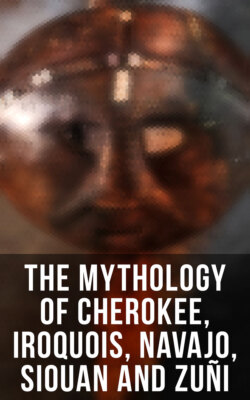Читать книгу The Mythology of Cherokee, Iroquois, Navajo, Siouan and Zuñi - James Mooney - Страница 62
На сайте Литреса книга снята с продажи.
Fetishism
ОглавлениеSide by side with animism and totemism flourishes a third type of primitive belief, known as 'fetishism.' This word is derived from the Portuguese feitiço, 'a charm,' 'something made by art,' and is applied to any object, large or small, natural or artificial, regarded as possessing consciousness, volition, and supernatural qualities, and especially orenda, or magic power.
As has been said, the Indian intelligence regards all things, animals, water, the earth, trees, stones, the heavenly bodies, even night and day, and such properties as light and darkness, as possessing animation and the power of volition. It is, however, the general Indian belief that many of these are under some spell or potent enchantment. The rocks and trees are confidently believed by the Indian to be the living tombs of imprisoned spirits, resembling the dryads of Greek folk-lore, so that it is not difficult for him to conceive an intelligence, more or less potent, in any object, no matter how uncommon—indeed, the more uncommon the greater the probability of its being the abode of some powerful intelligence, incarcerated for revenge or some similar motive by the spell of a mighty enchanter.
The fetish is, in short, a mascot—a luck-bringer. The civilized person who attaches a swastika or small charm to his watch-chain or her bangle is unconsciously following in the footsteps of many pagan ancestors; but with this difference, that the idea that 'luck' resides in the trinket is weak in the civilized mind, whereas in the savage belief the 'luck' resident in the fetish is a powerful and living thing—an intelligence which must be placated with prayer, feast, and sacrifice. Fetishes which lose their reputations as bringers of good-fortune usually degenerate into mere amulets or talismanic ornaments, and their places are taken by others. The fetish differs from the class of tutelary or 'household' gods in that it may be sold or bartered, whereas tutelary or domestic deities are never to be purchased, or even loaned.
